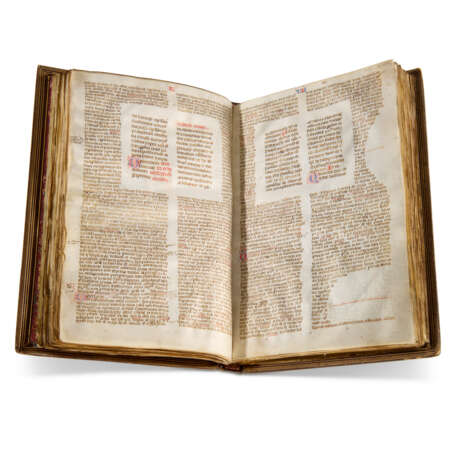ID 1214867
Lot 22 | Pope Clement's Constitutions
Estimate value
£ 10 000 – 15 000
Pope Clement V (d. 1314), Constitutions, with the Bulla of Pope John XXII (d. 1334) and Gloss of Johannes Andreae (d.1348), in Latin, decorated manuscript on vellum [France (Paris), mid-14th century]
An early, complete, copy of the most important legal text of the 14th century.
310 × 200 mm, iii + I + 95 + iii leaves (the endleaves unnumbered; the first medieval leaf treated here as f.1, the first leaf of the main text treated here as f.2 but paginated 1–2; two leaves skipped in the initial foliation after ff.40 and 80 are now ff.40a and 80a), complete, collation: 1-812, catchwords throughout, written in two columns of main text of very variable width, with a very variable number of lines per page and, surrounded on all outer sides by the gloss in smaller, more closely-spaced script with about 65 lines per column, ruled space (for the gloss): 270–75 x 170–80mm, the end of the gloss often written with short lines so that the texts ends on the last line of the page, decorated with two-line initials alternately blue with red penwork or vice versa, large puzzle initials in red and blue with penwork ornament in both colours (the sheepskin(?) vellum of mediocre quality with frequent natural flaws, uneven edges, and variable colour, the margins often narrow). Bound in 19th-century brown leather, signed on the front turn-in by Townsend & Son, Sheffield, the covers framed with multiple gilt fillets of varying widths, the spine with title in gilt capitals ‘Constitu- / ciones Clementis / Papæ V. / M. S.’
Provenance:
(1) Although previously attributed to Bologna, the opening text, script (with its crossed tironian ‘et’ symbol), and the flourishing of the coloured initials instead indicate Paris as the place of production, probably just a few decades later than 1326, when Andreae completed the Gloss.
(2) 14th/15th-century marginalia include a reference to ‘Willielmus Mandagoti’ (f.10v, lower margin), i.e. Cardinal Guillaume de Mandagout (d.1321), who wrote a treatise on the election of bishops.
(3) A 16th-century French owner has written his motto twice: ‘Deum timenti bene erit’ (ff.1v, 95v); he may also have been responsible for the added running titles in the upper corners.
(4) William Bragge (1823-1884), book collector and civil engineer of Birmingham and Sheffield, perhaps bound for him, and certainly in the present binding when in his sale at Sotheby's, 8 June 1876, lot 152; bought for £2 by Quaritch; offered in their A general catalogue of books […] the supplement: 1875–1877 (1877), p.1305 no 18,359.
(5) Henry White (1821/2–1900), JP, DL, FSA, with his armorial bookplate with motto ‘Præsto et persto’; ‘This MS was lot 536 in the Henry White sale at Sotheby's, 21 April 1902, and was then bought by Ridler for £4.18.0’ (as recorded by Sydney Cockerell on f.ir; on William Ridler, see P. Kidd, Medieval Manuscripts from the collection of T. R. Buchanan in the Bodleian Library (Oxford, 2001), pp. xxii–xxiv).
(6) Bernard Quaritch Ltd, c.1930s: with their characteristic number ‘762’ written obliquely in a rectangle (f.ir) and price-code on the last flyleaf.
(7) Sotheby’s, 6 December 1993, lot 50, bought by Fogg.
(8) The Schøyen Collection, MS 2160.
Content:
List of contents, added in a 15th-century French hand: ‘De rescriptis, De electione, De renunciationibus, […]’, f.1, the verso blank; Pope John XXII, Bulla addressed to the doctors and scholars of the university of Paris: ‘Incipiunt constituciones Clementis pape quinti. Johannes episcopus servus servorum dei dilectis filiis doctoribus et scholaribus universis Parisius […] Quoniam nulli iuris sanctio […] Expliciunt constituciones Clementis pape quinti. Deo gracias’; surrounded on every page by the Gloss: ‘Johannes. graciosum hoc nomen per interpretaciones vel ethimologias extollere […] Explicit apparatus septimi libri Johannis Andree super Clementinis’, ff.2-94v.
The main text of Canon Law from the 13th century onwards was the Decretales of Pope Gregory IX, arranged in five books; this was supplemented at the end of the 13th century by the Liber Sextus of Pope Boniface VIII. The so-called Clementines were compiled in the early 14th century at the behest of Pope Clement V (1305-14) who promulgated them less than a month before his death; they were formally promulgated again by a Bull sent out in 1317 to the universities of Bologna, Avignon, and Paris (as in the present example) by Clement's successor, Pope John XXII. The Constitutiones are therefore the seventh (and final) compilation of Canon Law and were unofficially known as the ‘Liber Septimus’, hence the ‘L VII’ in the running headings and the ‘septimi libri’ of the final explicit. The gloss on the text by Johannes Andreae (or Giovanni di Andrea in his native Italian), written c.1322, came to be the most widely used, and therefore known as the 'Glossa ordinaria', the ordinary gloss.
| Place of origin: | Italy, Europe |
|---|---|
| Auction house category: | Medieval & renaissance manuscripts, Books and manuscripts |
| Place of origin: | Italy, Europe |
|---|---|
| Auction house category: | Medieval & renaissance manuscripts, Books and manuscripts |
| Address of auction |
CHRISTIE'S 8 King Street, St. James's SW1Y 6QT London United Kingdom | |
|---|---|---|
| Preview |
| |
| Phone | +44 (0)20 7839 9060 | |
| Buyer Premium | see on Website | |
| Conditions of purchase | Conditions of purchase |







